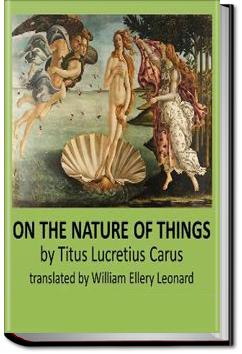UNLIMITED Audiobooks and eBooks
Over 40,000 books & works on all major devices
Get ALL YOU CAN for FREE for 30 days!
On the Nature of Things
Titus Lucretius Carus
Book Overview:
Written in the first century b.C., On the Nature of Things is a poem in six books that aims at explaining the Epicurean philosophy to the Roman audience. Among digressions about the importance of philosophy in men's life and praises of Epicurus, Lucretius created a solid treatise on the atomic theory, the falseness of religion and many kinds of natural phenomena. With no harm to his philosophical scope, the author composed a didactic poem of epic flavor, of which the imagery and style are highly praised.
Written in the first century b.C., On the Nature of Things is a poem in six books that aims at explaining the Epicurean philosophy to the Roman audience. Among digressions about the importance of philosophy in men's life and praises of Epicurus, Lucretius created a solid treatise on the atomic theory, the falseness of religion and many kinds of natural phenomena. With no harm to his philosophical scope, the author composed a didactic poem of epic flavor, of which the imagery and style are highly praised.
How does All You Can Books work?
All You Can Books gives you UNLIMITED access to over 40,000 Audiobooks, eBooks, and Foreign Language courses. Download as many audiobooks, ebooks, language audio courses, and language e-workbooks as you want during the FREE trial and it's all yours to keep even if you cancel during the FREE trial. The service works on any major device including computers, smartphones, music players, e-readers, and tablets. You can try the service for FREE for 30 days then it's just $19.99 per month after that. So for the price everyone else charges for just 1 book, we offer you UNLIMITED audio books, e-books and language courses to download and enjoy as you please. No restrictions.
Try now for FREE!

"Love your service - thanks so much for what you do!"
- Customer Cathryn Mazer
"I did not realize that you would have so many audio books I would enjoy"
- Customer Sharon Morrison
"For all my fellow Audio Book & E-Book regulars:
This is about as close to nirvana as I have found!"
- Twitter post from @bobbyekat



Community Reviews
Wow, this was a real surprise. Lucretius was just so shockingly ahead of his time. It's probably more important than Newton in terms of the sheer range of thought he originates. His conception of atomic theory is surprisingly accurate, down to recognizing that atoms are composed of about three diffe
Epicurian Physics
31 July 2013
Well, here I am, once again sitting in the passenger seat of my Dad's car on our final trek to Melbourne, and since I have been reading, sleeping, or driving for most of the day, I might as well fix up a couple of my reviews while I am sitting here (and since I have a s
First, an apology for only giving it three stars. I am well aware that this is a brilliant piece of poetry, but my Latin is very poor, and I rapidly abandoned my initial plan of reading it in the original with the English translation alongside. In a way, though, I'm following Lucretius's advice: he
Much on-target prediction. Philosophic argument combined with poetic aplomb. The nature of atoms, the movement of lightning, particles, sound, a refutation of the gods, sex and man's nature as opposed to the nature of non-sentient things. Attempts to locate the soul. Some missteps regarding the heav
“Therefore death to us
Is nothing, nor concerns us in the least,
Since nature of mind is mortal evermore.”
“ Now then, learn
How tenuous is the nature of an image.
And in the first place, since primordials be
So far beneath our senses, and much less
E'en than those objects which begin to grow
Too sma
The antiquity of this book calls for respect and appreciation. However, for a modern reader it is very boring to read. It's a long (300 pages) poem written in the first century BC in which the author pontificates about the physical sciences for the purpose of defending Epicureanism philosophy. It is